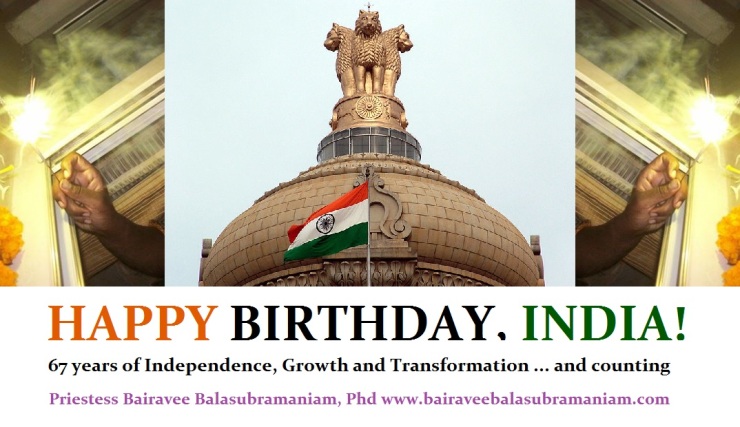AUGUST 15, 1947: INDIA’S INDEPENDENCE DAY (Happy Birthday, India!)
Today, over a billion people will be celebrating their independence, and the declaration of their sovereignty as a free republic. It is India’s Independence Day, and she’s celebrating it for the 67th time.
There are so many reasons to celebrate this day, for Indians in India and those of Indian origin living abroad. But, by the same token, there are plenty of reasons to reflect upon what else the nation seeks to accomplish, before all its citizens can be truly declared as ‘free’. For too many are still ensnared by the yoke of poverty, communalism, the fear of violence or degradation, and so on.
August 15th marks the transfer of power from a territory claimed and administered by the British Raj. This ceremony took place at the Red Fort in New Delhi where – at the stroke of Midnight. A day prior, in India’s Constituent Assembly, its first Prime Minister Jawaharlal Nehru delivered his oft-quoted speech: ‘Tryst with Destiny’. Here’s a link:http://www.youtube.com/watch?v=AzdVKGdZUpQ
But through the celebrations of freedom, one also has to remember that elsewhere, at the borders, the bloody wars of Partition raged on. It was not an easy birthing for the nation as it was born through a dual separation: (1) through the formality of British ceremony and legal codes and (2) through the forced cleavage of a land in the name of communal politics.
As we wave our flags and sing our anthems today, this shadow ought not be forgotten.
India’s political history is a long and multifaceted one, but this much can be said without controversy: Its independence was procured through the efforts of nation-wide struggle, that began with the nationalist movement. In its earliest form, it was a movement led by a ‘microscopic minority’ (to quote a former Viceroy of India) of Western-educated Indians – you could call them the liberal intelligentsia of their time. The movement acquired mass appeal and participation when Mahatma Gandhi entered the scene. Men and women rose in union as part of satyagraha (peaceful struggle), though there were contemporaries seeking to free India from its colonial oppressors through the use of violence as well.
The Constitution, legislative procedures and electoral arrangements of contemporary India bear witness to India’s colonial past. The Indian Parliament retains certain ritual performances and conducts ceremonies in ways strongly reminiscent of the ‘Mother of Parliaments’, i.e. Westminster. It is little wonder as, considering that the body of individuals tasked with drafting the new Republic’s constitution were largely made up of lawyers well versed in the language of British law.
That being said, despite (or perhaps, through) India’s legal inheritance, the Indian political sphere lives, breathes, thrives in displays of colourful authenticity. The performance of politics, as seen in parliament and state assemblies, is becoming increasingly ‘vernacularized’ – that is to say, it reflects certain social customs, mores, norms, and expectations of performance in line with the people of the land itself.
As I argued in my PhD on the Indian Parliament, let us not judge India on the basis of expectations set in a time so heavily influenced by colonial frameworks and standards – and as I awoke to this morning (listening to a professor on TV) – let us not judge it in terms of the accomplishments made by other countries, but by and on its own terms and ideals.
For India -is, was, and always will be – the world’s largest experiment in democracy. That understanding of democracy is deepening, transforming and evolving as we speak – showing us ways that it has matured in 67 years of growth, and areas which it is in dire need of attention.
For all of its economic development, and (relative) political stability, India still lags behind in areas pertaining to sustainable economic development, social equality, gendered equality, violence against women, and other issues – as judged by the ideals of its own Constitution.
Whilst I was not born in India, I am of Southern Indian origin. I’ve lived there with my family and have also conducted research on its political institutions. It is an identity that I am proud to affiliate myself with, but with the recognition – that there are still challenges to tackle, ways to evolve and new milestones to reach.
So here’s to 67 years of growth and many more to come!
Happy Birthday, India!
Priestess Bairavee Balasubramaniam, PhD
www.bairaveebalasubramaniam.com
Author of ‘The Dramaturgy of Ritual Performances in Indian Parliamentary Debates’, PhD thesis – http://wrap.warwick.ac.uk/54359/
Image Montage: Own photo, Bairavee Balasubramaniam, 2010. All rights reserved.
and (the image of the lions & flag) By Mellisa Anthony Jones at en.wikipedia [CC-BY-3.0 (http://creativecommons.org/licenses/by/3.0)], via Wikimedia Commons

You must be logged in to post a comment.